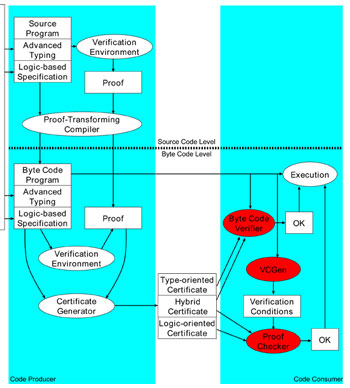
This issue in pdf Subscription Archive: Next issue: January 2006 |
|
||||
MOBIUS - Securing the Next Generation of Java-Based Global Computersby Gilles Barthe Global computers have the potential to realize the vision of ambient intelligence and to offer citizens a global and uniform access to services. Yet their success is conditioned by the development of appropriate security architectures that help establish trust and security in a global setting. Within the Global Computing 2 initiative, the FET Integrated Project 'MOBIUS' aims at providing the technology for securing next-generation global computers, building on the Proof Carrying Code paradigm. Global computers aim at providing a global and uniform access to services through distributed computational infrastructures consisting of very large numbers of interacting devices. Prominent examples include the Internet, banking and telephone networks, digital video infrastructures, peer-to-peer and ad hoc networks. While global computers may profoundly affect our quality of life, they will only become pervasive if novel security architectures are developed for bringing to users the level of reliability and security they expect for sensitive services. To realise this aim, the project will develop and combine type systems and program logics that can be used to ensure functionality and security policies for Java-enabled global computers. Next Generation Global Computers
In order to accommodate these trends, the next generation of global computers will also require that devices are extensible with the computational infrastructure, platform or libraries needed to execute services as requested. This evolution will cause global computers to escape the scope of computational models which permeate mobile code, the Grid, or agents, and which impose a sharp separation between untrusted mobile applications, and the fixed and trusted computational infrastructure upon which they execute. At the same time, the evolution towards autonomy and extensibility will create new security threats that would not be found in current computational models, and thus any security architecture for global computing must comply with requirements that reach far beyond the limits of the current state-of the art. A Security Architecture based on Verifiable Evidence
The security architecture builds on ideas from Proof Carrying Code (PCC), and requires that mobile code is provided with a certificate, ie a condensed mathematical proof that the code is secure. In order to be applicable to global computers, the MOBIUS project will pioneer a PCC architecture that accommodates the distributed nature of global computing and allows enforcement of advanced policies, including both functional properties and advanced security properties such as non-interference or resource control. To ensure scalability, the MOBIUS project will also extend and combine two prime enabling technologies of PCC, ie type systems and program logics, and use the strength of these two techniques in hybrid certificates, to be verified through combined type checking and proof checking. Finally, the MOBIUS project will develop certificate translation as a means to bring to the code consumers the benefits of program verification, which is almost universally performed at source code level.
To maximize its impact, the MOBIUS project is focusing on Java-enabled global computers, and uses program logics that support the Java Modelling Language (JML). It will allow an implementation of the MOBIUS security architecture to be built on top of existing tools developed within the consortium. This will be evaluated on case studies from a range of application domains, covered by the consortium industrial partners, and by the End User Panel. The project is coordinated by the French research institute INRIA, and is part of the pro-active initiative Global Computing 2, launched by the Future and Emerging Technologies unit of the IST programme. Link: Please contact: |
||||


